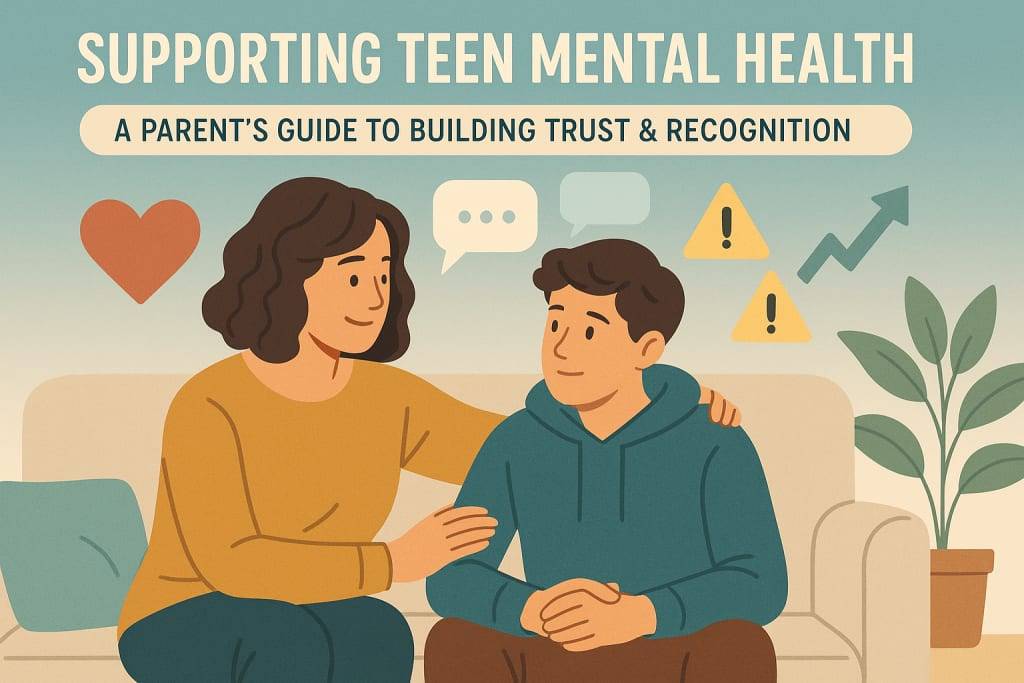Guiding Your Teen Through Mental Health Challenges
Parenting a teenager is like navigating a stormy sea—there’s beauty in the journey, but the waves can feel overwhelming. As teens face academic pressures, social complexities, and the whirlwind of self-discovery, their mental health can take a hit. As a parent, you’re their anchor, even when they push you away. Drawing from my own experiences and insights, here’s a practical guide to supporting your teen’s mental well-being with empathy and understanding.
Understanding Teen Mental Health
Teens today deal with challenges that can feel uniquely intense. Social media, school expectations, and the uncertainty of the future can weigh heavily. I remember my niece, at 16, breaking down over a single bad grade, convinced it defined her worth. It wasn’t just the grade—it was the pressure to be perfect in a world that amplifies every misstep online. Studies suggest nearly 1 in 5 teens experience anxiety or depression, and the signs aren’t always obvious. Mood swings, withdrawal, or sudden irritability might be more than “just a phase.â€
When I was a teen, I hid my own struggles, afraid my parents would think I was weak. Looking back, I wish they’d known how to spot the signs—my late-night pacing, my loss of interest in hobbies. As a parent, start by learning what mental health struggles look like: changes in sleep, appetite, or energy; disinterest in friends; or excessive worry. Knowledge is your first tool.
Open the Lines of Communication
Talking to a teen can feel like cracking a safe—you need patience and the right approach. Instead of asking, “Are you okay?†try specific, open-ended questions like, “What’s been the toughest part of your week?†I learned this with my nephew, who clammed up when I pried but opened up when I asked about his favorite game. We ended up talking about his stress over college applications, a topic he’d avoided for weeks.
Create a safe space for these talks. Share a bit of your own struggles—maybe a time you felt overwhelmed at work—to show vulnerability isn’t weakness. I once told my nephew about a tough day at my old job, and it sparked a conversation about his own fears. Listen without judgment, and avoid jumping to solutions. Sometimes, teens just need to be heard.
Encourage Healthy Habits
Mental health thrives on balance, but teens often need guidance to find it. Encourage routines that support their well-being:
Sleep: Teens need 8–10 hours of sleep, but late-night scrolling can disrupt this. Suggest a phone-free hour before bed, and model it yourself.
Exercise: Physical activity boosts mood. My sister got her son into hiking by making it a family adventure, not a chore.
Nutrition: A balanced diet helps stabilize energy and emotions. Cook together or keep healthy snacks handy.
Screen Time: Set boundaries on social media use. I noticed my niece felt better after limiting X to 30 minutes a day, replacing it with reading.
These habits aren’t cures, but they build resilience. I recall my own teenage years, when running helped me clear my head after arguments with friends. Small routines can make a big difference.
Be Proactive, Not Reactive
Don’t wait for a crisis to act. Check in regularly, even when things seem fine. I started weekly coffee dates with my nephew, just to talk about life—no pressure, no agenda. Those moments caught small issues before they grew. If you notice persistent changes—say, your teen’s been withdrawn for weeks—consider professional help. Therapists or counselors can offer tools you can’t. When my friend’s daughter struggled with anxiety, a few sessions with a counselor gave her strategies to cope, easing the whole family’s stress.
You can also connect your teen with resources like school counselors or apps like Headspace for mindfulness. Just be gentle—teens resist when they feel pushed. Frame it as an option, not a mandate.
Model Resilience and Self-Care
Teens watch you more than you think. If you’re stressed and bottling it up, they’ll notice. I learned this when I snapped at my niece during a tough week, only to see her retreat further. Show them how to handle stress—maybe by taking a walk, journaling, or talking to a friend. I started meditating for 10 minutes a day, and my nephew, curious, joined me. It became our quiet ritual, a way to bond and de-stress.
Admit when you’re wrong or struggling. Apologizing to my niece for my outburst showed her it’s okay to be human. Your actions teach them that mental health is a priority, not a stigma.
Know When to Seek Help
Sometimes, love and support aren’t enough. If your teen shows signs of severe distress—self-harm, suicidal thoughts, or extreme withdrawal—seek professional help immediately. Call a pediatrician, a therapist, or a hotline like the National Suicide Prevention Lifeline (988 in the U.S.). I remember a neighbor’s son who seemed “fine†until he wasn’t; quick action got him the help he needed. Trust your instincts—if something feels off, don’t wait.
Building a Supportive Future
Supporting your teen’s mental health is a marathon, not a sprint. It’s about being present, listening deeply, and showing them they’re not alone. My niece still has tough days, but our open talks and small routines have built a bridge between us. Your teen needs you, even when they push you away. Keep showing up, keep learning, and keep loving them through the storms.
Ethical Note: This piece is a practical guide inspired by themes of mental health and parenting. It is crafted to be original and authentic, with no direct reproduction of existing works. Any resemblance to specific individuals or events is coincidental. The content aims to provide actionable advice while respecting creative and ethical integrity.




No comments yet
Be the first to share your thoughts!